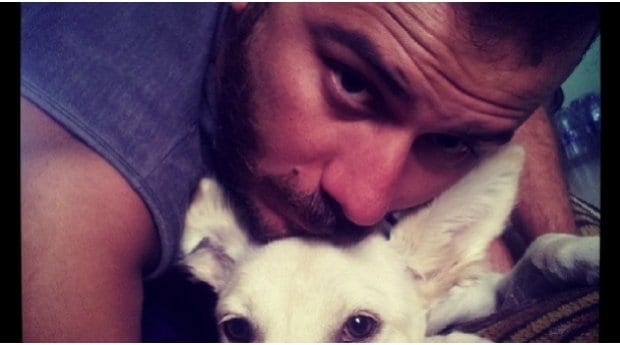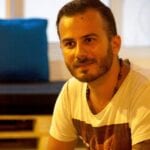“I’m scared.” I hear the words from the other side of the bed. I can’t see a thing; darkness and humidity encase the bedroom with a suffocating mystery.
“Hmm?” I respond calmly. “Why would you be?”
My boyfriend shifts his body closer to mine. We are in our apartment in Beirut. It’s late May 2013, and power and water have been gone for hours, making it unbearable to touch one another, as we are covered with a stinking layer of sweat.
“We have been waiting for a year, sitting around in Beirut, hoping for the best. I’m scared because I don’t know: would it work?” he says, and I know what he is talking about. “Would we indeed manage to escape Beirut to Vancouver? Would it work?” he continues, and I stare at the ceiling, but all I see is black.
It had been a year since we started discussing the possibility of immigrating as refugees to Canada. During this year, three explosions, one broken leg and countless power outages have devastated us. We lay in one bed, but we’re unable to bring ourselves to open up about how much we miss normal. How much we long for a life that doesn’t include the constant struggle for a dignified living.
We both were strong enough not to end up in a tent in a refugee camp; we both were strong enough to find our way in the maze known as Beirut and survive in this city full of contradictions: it is at once an expensive, racist, classist, beautiful and inviting place. You hardly experience a dull moment in Beirut, but sometimes, after escaping war and persecution in Syria, all you want might be a dull moment.
“We have to wait,” I tell my boyfriend. My dog, tiny and innocent, escapes the bed, sliding her body to the cool floor. I slide after her, taking off my shirt and enjoying the cold touch of the floor on my skin. My boyfriend hears our movement. Slowly, he joins us on the ground, taking off his shirt as well.
My fingers search in the dark for his, and we grab each other’s hands. “We have to wait,” I tell him, and squeeze his hand within mine.
***
The civil war in Syria has resulted in more than three million Syrian refugees registered with UNHCR, the UN refugee agency.
Around the Middle East, UNHCR is warning that the number of Syrian refugees might actually be double this number, as many of them are not registered.
Canada promised in 2013 to accept 1,300 Syrian refugees, including 1,100 privately sponsored by Canadian citizens. So far, the government has refused to say how many of those 1,300 have arrived in Canada. It has also refused to make any firm commitments after the UN issued a second appeal for help in resettling another 100,000 Syrian refugees in February.
My partner and I were among the first LGBT Syrian refugees to arrive in Vancouver, in a journey that took more than two years. First, we got to know a Canadian person who promised to help us emigrate. More than a year later, that person introduced us to a group of people, led by Canadian citizen Ron Rosell, who would become our sponsors.
Taking advantage of Canada’s Private Sponsorship of Refugees Program, the sponsors reached an agreement with the Canadian government. According to this agreement, the sponsors are to provide us with emotional, financial and logistical support during our first year in Canada. We are overwhelmed by our new lives, but the support we have received from Rosell and the other sponsors has been tremendous.
The most beautiful aspect of our arrival is the love we feel from this city that has welcomed us. Refugees often try to bring their original culture with them when moving to a new place, but I believe that LGBT refugees from Syria, tired of war, racism and homophobia, will integrate much faster into life in Vancouver, embracing the new culture the same way the city embraces them.
Sadly, other Syrian LGBT refugees, such as a lesbian couple going through the same refugee support program, are still stuck in the slow system. Weeks have passed since our friends heard back from the Canadian embassy in Beirut. Their tension is high; their hopes are down.
What most people do not realize is that every single moment counts: life as refugees in the Arab world during these harsh times is filled with dangers and hardships. Syrian refugees, especially LGBT refugees, face prejudice, homophobia and sectarianism in many host countries, and as the situation gets more tangled in Syria, the possibility of a solution fades away.
For now, I hope the promised 1,300 Syrian refugees arrive as soon as possible. I would like them all to feel the joy of getting out of the SkyTrain, leaving the Vancouver City Centre station, looking up at their beautiful new home and whispering, just like I do every morning, “I love this city.”
***
“I’m scared.” I hear the words from the other side of the bed. The covers are white, with autumn trees drawn on them; a calming light comes from the living room outside.
“Hmm?” I ask. “Why would you be?”
My boyfriend turns around. He smells of jasmine and body lotion; his tired body is curling to fit mine. We are both jetlagged. It’s September 2014, and we’re in our new apartment in Vancouver.
“Will we be able to make it here?” he asks, his fingers touching my side ever so slightly, like a professional pianist picking the right tune for his masterpiece. “Now that we’re here, I’m worried that we might fail, we might not be able to pull this off. We’re on the other side of the universe; we cannot afford to make mistakes.”
I smile and I grab his head, bringing it closer to my shoulder. He rests his tired brain on me as I begin to stroke his hair. “I got you, baby, I’m your safety net,” I tell him, smiling. “You know, you’re the second luckiest person in the world. When you were young, you dreamed of flying away to Canada; you dreamed of the possibility of getting more education, of moving higher in your career, and now the door is open for you to do all of this.”
I can feel his lips moving, printing kisses on my chest. “You’re indeed the second luckiest person in the world,” I continue. “You managed to come from the heart of Damascus, to the jungle of Beirut, then to the haven of Vancouver, and now you will do everything you ever wanted here.”
“Who is the first luckiest person in the world, then?” he asks, looking up at me, waiting for my answer.
“It’s me,” I respond, “for I have everything that I’ve ever wanted, plus I have you.”


 Why you can trust Xtra
Why you can trust Xtra


